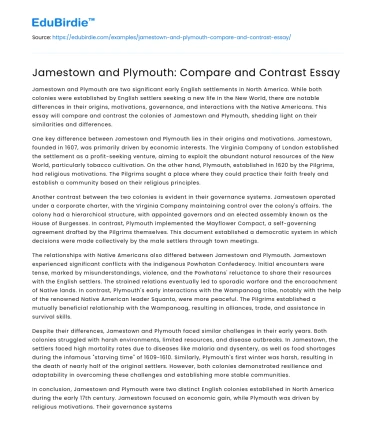Jamestown and Plymouth are two significant early English settlements in North America. While both colonies were established by English settlers seeking a new life in the New World, there are notable differences in their origins, motivations, governance, and interactions with the Native Americans. This essay will compare and contrast the colonies of Jamestown and Plymouth, shedding light on their similarities and differences.
One key difference between Jamestown and Plymouth lies in their origins and motivations. Jamestown, founded in 1607, was primarily driven by economic interests. The Virginia Company of London established the settlement as a profit-seeking venture, aiming to exploit the abundant natural resources of the New World, particularly tobacco cultivation. On the other hand, Plymouth, established in 1620 by the Pilgrims, had religious motivations. The Pilgrims sought a place where they could practice their faith freely and establish a community based on their religious principles.
Save your time!
We can take care of your essay
- Proper editing and formatting
- Free revision, title page, and bibliography
- Flexible prices and money-back guarantee
Another contrast between the two colonies is evident in their governance systems. Jamestown operated under a corporate charter, with the Virginia Company maintaining control over the colony's affairs. The colony had a hierarchical structure, with appointed governors and an elected assembly known as the House of Burgesses. In contrast, Plymouth implemented the Mayflower Compact, a self-governing agreement drafted by the Pilgrims themselves. This document established a democratic system in which decisions were made collectively by the male settlers through town meetings.
The relationships with Native Americans also differed between Jamestown and Plymouth. Jamestown experienced significant conflicts with the indigenous Powhatan Confederacy. Initial encounters were tense, marked by misunderstandings, violence, and the Powhatans' reluctance to share their resources with the English settlers. The strained relations eventually led to sporadic warfare and the encroachment of Native lands. In contrast, Plymouth's early interactions with the Wampanoag tribe, notably with the help of the renowned Native American leader Squanto, were more peaceful. The Pilgrims established a mutually beneficial relationship with the Wampanoag, resulting in alliances, trade, and assistance in survival skills.
Despite their differences, Jamestown and Plymouth faced similar challenges in their early years. Both colonies struggled with harsh environments, limited resources, and disease outbreaks. In Jamestown, the settlers faced high mortality rates due to diseases like malaria and dysentery, as well as food shortages during the infamous "starving time" of 1609-1610. Similarly, Plymouth's first winter was harsh, resulting in the death of nearly half of the original settlers. However, both colonies demonstrated resilience and adaptability in overcoming these challenges and establishing more stable communities.
In conclusion, Jamestown and Plymouth were two distinct English colonies established in North America during the early 17th century. Jamestown focused on economic gain, while Plymouth was driven by religious motivations. Their governance systems, relationships with Native Americans, and early challenges differed significantly. Jamestown operated under a corporate charter and had tumultuous interactions with the Powhatan Confederacy, while Plymouth implemented the Mayflower Compact and established peaceful relations with the Wampanoag tribe. However, both colonies faced difficulties and ultimately shaped the foundation of European colonization in the New World. Despite their contrasting origins and experiences, Jamestown and Plymouth remain integral parts of American history, representing different aspects of the early colonial period.






 Stuck on your essay?
Stuck on your essay?

